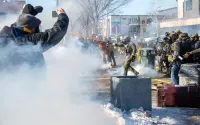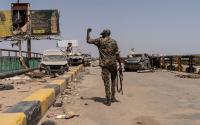The Afghan war has increased hunger and banditry but will not reduce the terror threat
The Guardian, 22 November, 2001Ten days after victory was declared in the Afghan war, real life continues to make a mockery of such triumphalism in the cruellest way. As American B-52 bombers pound Taliban diehards around Kandahar and Kunduz, tens of thousands of refugees are streaming towards the Pakistani border and chaotic insecurity across the country is hampering attempts to tackle a fast-deteriorating humanitarian crisis.
Aid agencies confirm that six weeks of US bombing - which even the British government concedes has killed hundreds of civilians - has sharply exacerbated what was already a dire situation and Oxfam warned yesterday they were "operating on a precipice". More than 100,000 people are now living in tents in the Kandahar area alone and the charity has been asked by Pakistan to gear up camps across the border to receive similar numbers in the next few days. After an aid convoy was hijacked by local warlords on the Kabul-Bamiyan road on Tuesday, Oxfam and and other agencies argue that only a UN protection force can now prevent widespread starvation outside the main towns and distribution centres.
But of course the return of lawlessness and competing warlords was an inevitable and foreseen consequence of Anglo-American support for the long-discredited Northern Alliance, just as the humanitarian disaster has been the widely predicted outcome of the attack on Afghanistan. It was reportedly British advice that led to the decision to rely on the heroin-financed gangsters of the Northern Alliance to drive the Taliban out of Kabul and the north. If so, it will be a struggle even for Tony Blair to chalk it up as another feather in the cap of his doctrine of international community.
The effect of US and British intervention in Afghanistan has been to breathe new life into the embers of a 20-year-old civil war and hand the country back to the same bandits who left 50,000 dead in Kabul when they last lorded it over the capital. What has been hailed in the west as a liberation for women from the Taliban's grotesque oppression is being treated very differently by Afghan women's organisations. The widely praised Revolutionary Association of the Women of Afghanistan, for example, described the return of the alliance as "dreadful and shocking" and said many refugees leaving Afghanistan have been even more terrified of their "raping and looting" than of US bombing.
British and American politicians have gone out of their way to praise the restraint of their new friends, now absurdly renamed the United Front, even when its soldiers have been filmed maiming and executing prisoners. But then by supporting the alliance so decisively, they are indirectly complicit in what are unquestionably war crimes. That complicity moved a stage further on Monday, when US defence secretary Donald Rumsfeld announced he was determined to prevent thousands of Arab, Pakistani and Chechen fighters in Kunduz from escaping as part of any surrender agreement. He hoped, he said, they would be "killed or taken prisoner", but added that US forces were "not in a position" to take prisoners. Since Northern Alliance commanders have repeatedly made clear that they will not take foreign volunteers prisoner - and are reported already to have killed hundreds they have captured - the implication of Rumsfeld's remarks was pretty unmistakable.
Perhaps we should not be surprised. The US government appears to be increasingly impatient with any kind of restraint on its use of naked force. In the past week or so, it has repeatedly bombed areas known to be free of Taliban or al-Qaida forces - such as the town of Gardez, where at least seven civilians were killed in one raid; rocketed the offices of al-Jazeera, the freest television station in the Middle East; threatened to sink any ship in the Arabian sea that resists being boarded; and ordered the setting up of domestic military tribunals, with powers to try secretly and execute suspected foreign terrorists.
Nor, as Clare Short's complaint about the US almost turning its back on the rest of the world highlighted, does it seem to have much time for Tony Blair's plans for troop deployments, peacekeeping and nation building in poverty-stricken central Asia. But then nobody now in power in Afghanistan - whether the factions of the Northern Alliance, the southern Pashtun warlords or the remnants of the Taliban theocrats - wants foreign troops in their country, as the marines at Bagram air base have discovered.
Only Afghans can create a viable political future for themselves; foreign interference has been at the heart of Afghanistan's 20-year disintegration. Perhaps the warlords will come to an accommodation - though it's hard to believe - and the talks due to be held in Bonn on Monday will start to cobble together some semblance of a broad-based government to rebuild the cluster bomb-blasted wreckage of their society. But for the US, this is a second-order issue. It now smells the blood of its quarry, the man held responsible for the attacks on the World Trade Centre and the Pentagon. If Bin Laden is captured and killed in the next few days, as the US and British military seem increasingly confident will happen, the Afghan campaign will be celebrated as a decisive breakthrough in the war against terror - and the US will move on, turning its attention to Iraq and elsewhere, after mopping up a few foreign jihad enthusiasts.
But in reality it is likely to be nothing of the sort. The war against the Taliban has so dominated the global response to the atrocities of September 11, it is hard to remember that the Kandahar clerics probably had nothing directly to do with them. And even if Bin Laden and his Afghan-based acolytes knew of the attacks in advance, it is highly unlikely that they were involved in the detailed planning, not least because of the intense surveillance he was under and the logistical problems of communication from one of the world's most technologically backward countries. Despite the best endeavours of US investigators to make the link, there seems to be no reliable evidence that the hijackers even trained in Afghanistan - though several did in the US. Western governments exaggerate the importance of state sponsorship to terror campaigns.
The case against the Afghan war was never that the Taliban would turn out to be a latterday Vietcong - critics predicted they would be defeated - but primarily that it would lead to large-scale civilian casualties, fail to stamp out anti-western terrorism, create a political backlash throughout the Muslim world and actually increase the likelihood of further attacks. In the absence of any serious effort to address the grievances underlying anti-US hatred, that argument has been strengthened. It was clear long ago, certainly since the demise of the Soviet Union, that no state could defeat the US in a conventional military confrontation and that only the war of the flea - guerrilla warfare or terrorism - could be effective. The Afghan debacle has hammered that lesson home.






